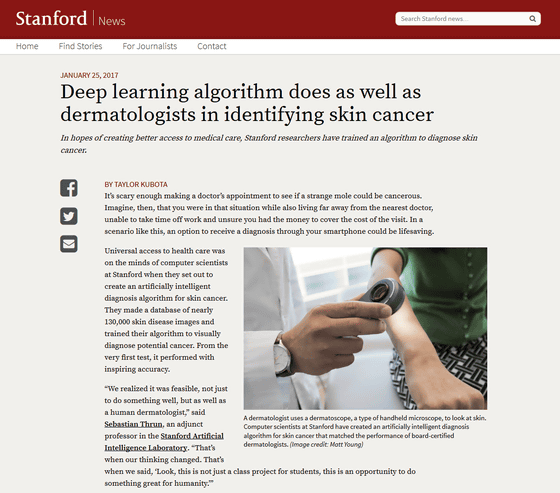It is possible to discriminate skin cancer from images without relying on human beings

ByPaul Stainthorp
In November 2016Google's deep learning technology accurately identifies eye diseases caused by diabetes more than specialistsAs I said, there are signs that artificial intelligence (AI) is likely to be active in the medical field. To take on this trend, the research team at Stanford University "cultivates" algorithms that can use deep learning to identify whether or not skin cancer is an image (picture).
Artificial intelligence used to identify skin cancer | Stanford News
http://news.stanford.edu/2017/01/25/artificial-intelligence-used-identify-skin-cancer/

This research content was published on the online edition of the academic journal Nature on January 25, 2017.
Dermatologist-level classification of skin cancer with deep neural networks: Nature: Nature Research
http://www.nature.com/nature/journal/vaop/ncurrent/full/nature21056.html
Diagnosis of skin cancer is mainly done with "visual inspection" using the naked eye and a skin microscope. When the dermatologist believes that it is "skin cancer" or if it can not be determined visually, go to the next step "biopsy".
What the research team at Stanford University did is to let the computer handle this "visual" part. Just like a dermatologist looks at the skin microscope, I will identify the cancer by reading a picture of the area where skin cancer is suspected.
If the team is "convolutional neural networks (CNN:Convolution neural network) "Is not constructed from scratch, the base is made by Google who learned 128 million images for 1000 kinds of object categories. The thing that this algorithm can do is something like "Can be distinguished between dogs and cats", so the team said "Seborrheic keratosisIt is necessary to raise the ability to the point that it can distinguish malignant cancer from malignant cancer. "
The research team "educates" CNN by using the data set of 12,3450 sheets made up of 2032 kinds of diseases by being provided from the medical department and collecting from the Internet.
As a result, when I showed a case where more than 370 skin cancer was suspected in educated CNN, it was almost the same accuracy as 21 dermatologists who identified the same picture.
At present it is only for "computers", but the research team is planning to make it available for smartphones, and the transplant itself is considered not to be so difficult. Since smartphones also have cameras, the era of "you can discern whether skin cancer is on the spot you shot" may not be so far.
Related Posts:
in Science, Posted by logc_nt







